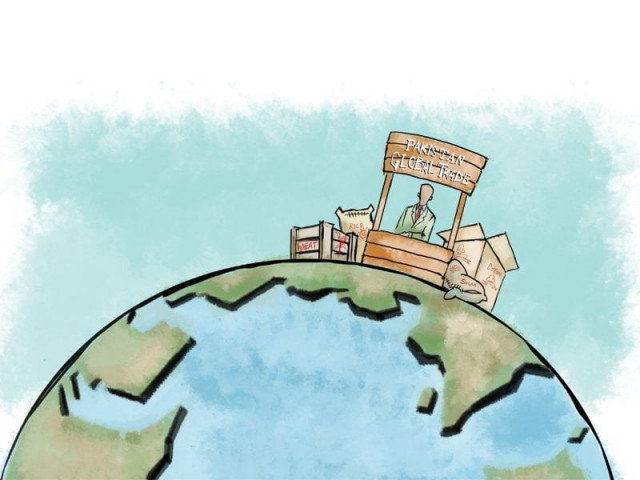Aspirations to go global: PMEX working to become hub for investments
Wants to harmonise domestic and global markets in commodities futures trading.

According to Ali, the net volume of commodities traded at the PMEX in the last three months came to around Rs100 billion rupees. ILLUSTRATION: JAMAL KHURSHID
The Pakistan Mercantile Exchange (PMEX) is facing lots of challenges on its way to making Pakistan a global hub for cotton trading, but the management is working to educate stakeholders to help it achieve the goal, PMEX Chief Business Officer Mansoor Ali told participants in a seminar.
“The main hurdle for us is the streamlining of domestic markets, where buyer and sellers still adhere to centuries-old trading patterns. We are trying to educate stakeholders about the importance of trading in commodities by means of future contracts via electronic trading. This will take time – years, in fact – but we are confident,” he observed.
PMEX – the first technology-driven, web-based, demutualised commodity exchange in Pakistan – started its operations in May 2007. It is licenced and regulated by the Securities and Exchange Commission of Pakistan and has 100% institutional shareholding.
PMEX is currently implementing its vision of bringing international markets of commodities like gold, silver, crude and palm oil to domestic platforms, and taking domestic markets for commodities like rice, cotton, wheat and sugar to international platforms. It is ambitiously working to become a platform where investors are just as willing to invest their money in commodities as they are in stocks. It wants to attract equal amounts of investment as the stock exchanges, bond, currency and related markets do.
According to Ali, the net volume of commodities traded at the PMEX in the last three months came to around Rs100 billion rupees; he also claimed that, in 2012, the volume traded at PMEX was just beneath the volume traded at all stock exchanges in Pakistan, which clocked in at just under Rs1.10 trillion.
“With the introduction of PMEX, investors have been provided the option to trade in commodity futures contracts at both the national and international level, without fear of losing money in fraud,” Ali said. “But a majority of investors in Pakistan are still unaware of this instrument, which has already been adopted by the modern world in the last 15 years. This needs to be resolved at both the national and domestic level by educating people about the importance of futures trading.”
“There are over 500 markets in Pakistan, and each has its own rates. Once the rates are streamlined into a single tradable price, commodity scripts will become more volatile and more investors will opt to invest in commodities [to benefit from margins between highs and lows],” he said. “Only then will we be able to make cotton our primary commodity for global trade,” he added.
While briefing on new scripts in the pipeline, Ali said that a soft opening for cotton futures scripts has already started from December 21, 2012. “Currency trading will also be started in about two months’ time, as the Securities and Exchange Commission of Pakistan has cleared us; however, we are waiting for approval from the State Bank of Pakistan.”
“Besides these two, treasury bills, domestic cotton futures, cotton seeds, copper, steel and futures of refined petroleum products [will also be traded],” he added.
Published in The Express Tribune, January 25th, 2013.
Like Business on Facebook to stay informed and join in the conversation.



















COMMENTS
Comments are moderated and generally will be posted if they are on-topic and not abusive.
For more information, please see our Comments FAQ